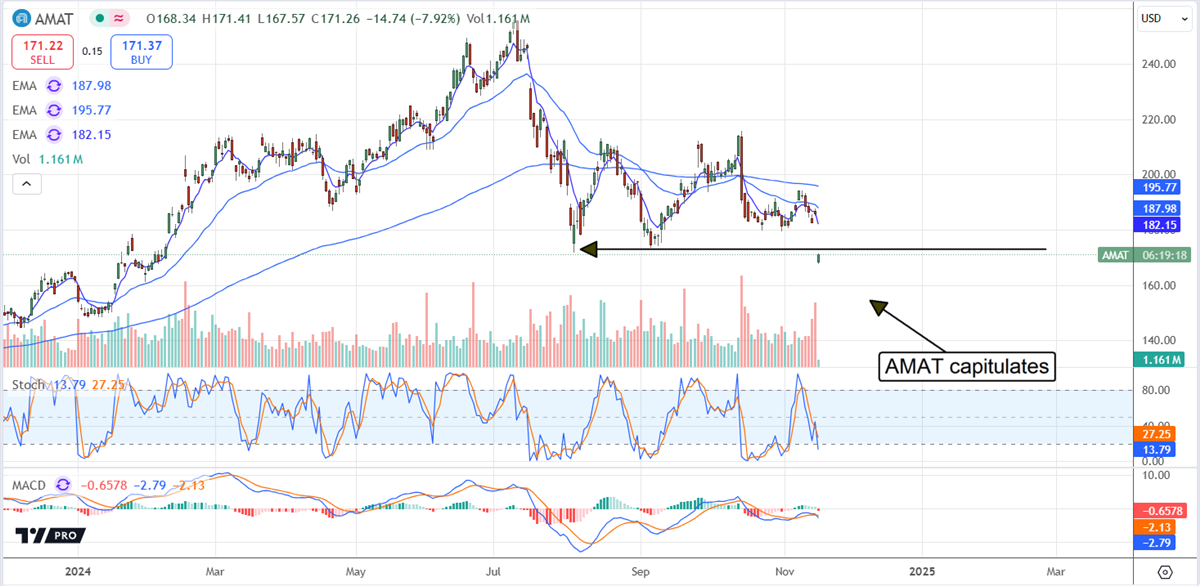Applied Materials Bounces Back: Key Reasons to Consider Buying
2024.11.19 06:05
- After months of downward pressure, the Applied Materials market capitulated in November.
- Guidance was uninspiring compared to the outlook, but sustained growth, growth will accelerate, and capital returns will flow.
- The company is well-positioned to sustain growth, maintain its fortress balance sheet, and pay investors to hold it.
The Applied Materials Inc (NASDAQ:) market capitulated following the Q4 results and guidance, cratering in premarket action to gap lower and open near break-even for the year. The capitulation was caused by lackluster guidance, but the bar was high, and Applied Materials failed to impress. The takeaway for investors is that this company is well-positioned for long-term growth, has sustained positive cash flow and capital returns, and is now trading at rock-bottom prices.
Applied Materials’ focus on materials engineering is critical to advancing semiconductor technology. The increasingly complex microchips rely on miniaturization and, in turn, durability, which are areas in which AMAT excels. The chips need to be more durable the smaller they get because of AI’s manufacturing process and intense power loads.
Applied Materials is the leader in this field because it has the most comprehensive portfolio of tools for modifying materials at the atomic level. Its tools and services span semiconductor manufacturing, providing an integrated, one-stop solution for semiconductor manufacturers and labs.
Here are three reasons why now is a good time to buy it.
1. Applied Materials had a Good Q4 and 2024
The first reason Applied Materials is a buy is that it had a good year, with revenue and earnings exceeding the consensus estimates and guidance improving throughout. The take in Q4 topped $7.0 billion in consolidated revenue, good for a gain of nearly 5% to outpace MarketBeat’s reported consensus by over 100 basis points and set a company record.
The strength was driven by growth in two of three segments, with the weakness centered on Display, which is only 3% of the net. Services grew by 11%, while the semiconductor solutions segment, 73% of the revenue, grew by 6%. Within the semiconductor solutions segment, Foundry was strongest taking 400 basis points of share contribution from DRAM and momentum is expected to build in Q1. The guidance is forecasting growth to accelerate.
2. Applied Materials Business Strong Cash Flow Funds Healthy Capital Return
The second reason Applied Materials is a buy is that the business is operationally sound and drives value for its investors. The company has strong margins, robust cash flow, a healthy balance sheet, and the ability to pay investors. Highlights from Q4 include record operating income with a 29.3% margin, $2.58 billion in cash from operations, a 75% increase in quarterly free cash flow (flat for the year), and free cash flow of $2.168 billion.
Capital returns are 65% of the free cash flow for the year, with both expected to remain strong in 2025. Capital returns include a dividend and buybacks. The dividend is below the broad market average regarding its yield, about 1%, trading at long-term lows, but the distribution is safe at less than 20% of the earnings and can be expected to grow. The buybacks are more substantial, more than 3X the dividend on a dollar basis, and reduced the share count by 1.6% for the quarter and 1.3% for the year.
3. The Guidance is Good and Likely Cautious
The guidance for FQ1 was mixed and tepid regarding the consensus estimate but no less good for investors. The company is guiding for sequential and YOY growth, with YOY growth to accelerate from Q4. Revenue is expected to be near $7.15 billion at the mid-point compared to $7.25 billion forecasted by analysts, which is a slim margin of error and easily overcome. Applied Materials has beaten its revenue target in the last ten consecutive quarters and will likely do so again.
Even so, the earnings guidance is good, with adjusted EPS expected above the consensus for the quarter. With revenue expected to be strong, the final result for earnings will likely also exceed the company’s guidance. The critical detail is that the cash flow will grow, improving the balance sheet health and capital return outlook.
As it is, the balance sheet is a fortress with cash and assets growing, liabilities under control, and equity up 16%. Leverage remains low, the company is net cash, and the trends supporting the balance sheet health will continue in 2025. 
Original Post








